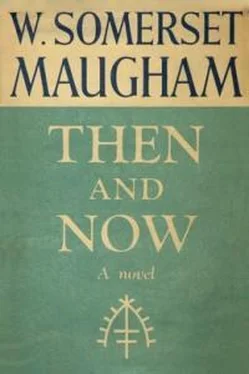“Read your play, Niccolò. You know I don’t like to hear you say things like that.”
With a smile Machiavelli took his manuscript and began to read.
“ A Street in Florence. ”
But then he was seized with the slight misgiving of an author who reads something for the first time to a friend and is not sure that it will please. He interrupted himself.
“This is only a first draft and I daresay I shall make a good many changes when I go over it again.”
He flipped the pages uncertainly. The play had amused him to write, but one or two things had happened that he had not counted on. The characters had taken on a life of their own and had diverged a good deal from their models. Lucrezia had remained as shadowy as Aurelia had been and he had not seen how to make her more substantial. The exigencies of the plot had obliged him to make her a virtuous woman induced by her mother and her confessor to submit to something her conscience disapproved of. Piero, whom he had called Ligurio, on the contrary played a much greater part than he had expected. It was he who suggested the scheme by which the foolish husband was taken in, he who got round Lucrezia’s mother and the monk, he in short who staged the intrigue and conducted it to a happy conclusion. He was astute, ingenious, quick–witted and pleasantly unprincipled. Machiavelli found it very easy to put himself into the rascal’s shoes, but by the time he had finished discovered that there was as much of himself in the artful schemer as there was in the lovesick gallant whom he had made his hero.
Thinking how odd it was that he should play two parts in one play, he looked up and asked Biagio:
“By the way, have you heard anything lately of your nephew Piero?”
“In point of fact I have. I meant to tell you, but with all the excitement of Il Valentino’s death I quite forgot. He’s going to be married.”
“Is he? Is it a good match?”
“Yes, he’s marrying money. You remember Bartolomeo Martelli at Imola? He was some sort of relation of mine.”
Machiavelli nodded.
“When Imola revolted he thought it safer to get away till he saw how things were going. You see, he’d been one of the Duke’s chief partisans and he was afraid he’d have to pay for it. He went to Turkey, where he had a business. The papal troops got to the city before there were any real disturbances and as luck would have it Piero was with them. It seems he was well liked by some influential men who had the ear of the Pope and he managed to protect Bartolomeo’s property. But Bartolomeo was banished and lately the news has arrived that he died in Smyrna and so Piero is going to marry the widow.”
“Very right and proper,” said Machiavelli.
“They tell me she’s young and good–looking; evidently she needed a man to protect her and Piero has a head on his shoulders.”
“That was the impression he gave me.”
“There’s only one fly in the ointment. Bartolomeo had a little boy, between three and four years old, I think he is, and that won’t improve the prospects of any children Piero may have.”
“I think you may be sure that he will cherish the little boy as if he were his own,” said Machiavelli dryly.
He returned to his manuscript. He smiled with some complacency. He could not help thinking that he had succeeded with Fra Timoteo. His pen had been dipped in gall and as he wrote he chuckled with malice. Into that character he had put all the hatred and contempt he felt for the monks who fattened on the credulity of the ignorant. On that character his play would stand or fall. He began again.
“ A Street in Florence. ”
He stopped and looked up.
“What is the matter?” asked Biagio.
“You say that Caesar Borgia suffered the just punishment of his crimes. He was destroyed not by his misdeeds, but by circumstances over which he had no control. His wickedness was an irrelevant accident. In this world of sin and sorrow if virtue triumphs over vice, it is not because it is virtuous, but because it has better and bigger guns; if honesty prevails over double–dealing, it is not because it is honest, but because it has a stronger army more ably led; and if good overcomes evil, it is not because it is good, but because it has a well–lined purse. It is well to have right on our side, but it is madness to forget that unless we have might as well it will avail us nothing. We must believe that God loves men of good will, but there is no evidence to show that He will save fools from the result of their folly.”
He sighed and for the third time started reading.
“ A Street in Florence. Enter Callimaco and Ligurio…. ”
THE END








